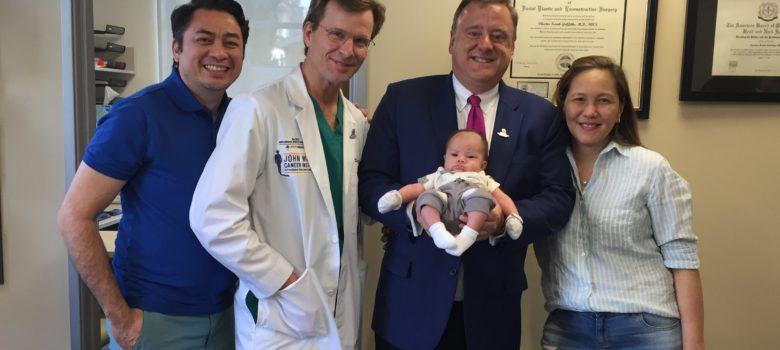

Patient Story: Love’s Meningioma Surgery
by Guest Author
Find out more about how an international patient’s trip to Pacific Neuroscience Institute saved both her life, and the life of her unborn child.
A Silver Lining to Brain Tumor Surgery
A lot can happen in a year. Just ask Love and James Royo. The couple, who live in the Philippines, own a construction and real estate business and have two children in their 20s. They looked forward to a fulfilling future running their business and enjoying their new grandchild. They never expected that Love would face a brain tumor.
Everything changed one evening last August when the left side of Love’s body suddenly went numb. She crumpled, but luckily her co-workers caught her before she fell to the ground. She also began to notice she was losing her vision.
Love’s Diagnosis and Treatment
Eventually, she was diagnosed with a meningioma, a tumor of the membrane surrounding the brain and in Love’s case it was growing under the optic nerves, stretching and compressing them, causing her vision to fail.
These types of non-cancerous tumors tend to occur more commonly in women, often at older ages. The Royos were told that Love would need a craniotomy to remove the tumor, which involves removing part of the skull bone.
James hated the idea of such invasive surgery and began looking for options online. After extensive research, he concluded the Pacific Neuroscience Institute (PNI) offered the best choice. He emailed PNI director Daniel F. Kelly, MD, a neurosurgeon and the head of PNI’s Brain Tumor and Pituitary Disorders Center. He hoped he would hear back.
Dr. Kelly responded quickly and the Royos sent him Love’s MRI and medical records.
The specialists at PNI regularly work with international patients and those from throughout the United States. They can consult, via email or Skype, with patients who have newly diagnosed or recurrent pituitary, brain, skull base or orbital tumors and provide recommended treatment options within a day or two.
“Love had a large tumor in the area of her pituitary gland that was compressing her optic nerves and optic chiasm,” says Dr. Kelly.
“It was in a typical spot where we often see meningiomas occur. Dr. Chester Griffiths (Director of the Eye, Ear and Skull Base Center, Head and Neck Surgery and Endoscopic Skull Base Surgery) and I were confident we could remove it through an endonasal endoscopical technique using both nostrils with a high-definition surgical telescope and fine micro-instruments. ”
The Royos traveled to the United States and spent a long day at PNI undergoing evaluations by Drs. Kelly and Griffiths as well as Dr. Howard Krauss of Neuro-ophthalmology, and getting a new MRI of the pituitary region and blood work including pituitary hormonal testing.
That’s when the couple received their second big surprise: Love was pregnant. Love and James felt mixed emotions: Surprise that they conceived at the age of 46. Excitement at the prospect of a new baby. And fear for the baby’s wellbeing.
“We entrusted everything to the team at PNI and to God,” says James.
By this time, Love’s vision had severely deteriorated. She couldn’t see in one eye and had limited vision in the other. At the same time, her pregnancy (now early in the 2nd trimester) complicated the situation.
“The beauty of PNI and our Pacific Pituitary Disorders Program is that under one roof Love could see the neurosurgeon, the ENT (Ear, Nose and Throat), the endocrinologist and the neuro ophthalmologist,” says Dr. Kelly. “We could address the hormonal aspects, the vision aspects, the surgical approach … It’s a pretty unique set up that allows a patient to be fully assessed in one visit. Most academic centers aren’t set up in that way.”
Drs. Kelly and Griffiths performed endoscopic endonasal removal of the meningioma on December 21st, 2018. They were able to remove Love’s tumor while preserving her pituitary gland, which was crucial for a healthy pregnancy and taking the pressure away from her optic nerves and optic chiasm.
“We use this endoscopic endonasal surgery for many midline brain tumors and for virtually all pituitary tumors,” says Dr. Kelly. “The visual outcomes are better and it’s a gentler approach to the nerves, and eliminates the need for manipulation of the brain itself which.”
Love’s Recovery
Love spent only two days in the hospital before being discharged. Her vision immediately improved and continued to do so over subsequent weeks.
She remained in California to have her baby, staying with James’s sister and her family, who live near Sacramento. She gave birth to a healthy baby boy on May 29th.
Dr. Kelly noted that this was not the first time he and his colleagues had treated a pregnant woman with a meningioma with rapidly deteriorating vision. In fact, they saw a similar case earlier in the year with a woman from New York and an additional case in a pregnant woman with twins 13 years ago. All 3 women have had excellent visual recovery, successful pregnancies and maintained normal pituitary gland function.
“Meningiomas occur more often in women and are known to have estrogen and progesterone receptors,” he says. “It’s good to know that we can take a pregnant woman through brain tumor surgery (preferably in the 2nd trimester), which of course entails anesthesia and other interventions, and still see a successful delivery and birth.”
Dr. Kelly says Love has a very good prognosis, with markedly improved vision and full functioning of her pituitary gland.
“We were so blessed with their professionalism” James says of their experience at PNI. “We thought that Love’s pregnancy would delay her surgery, but they are the best at what they do and found a way to continue the operation and keep the baby safe.”
Now six months old, their son is thriving.
“It’s our honor to remember their kindness, efficiency and professionalism in treating Love and giving her another chance at life,” he says regarding Drs. Kelly and Griffiths.
They’ll never forget it. They named the baby Kelly Griffith.
Pacific Brain Tumor Center and Pacific Pituitary Disorders Center
A first opinion isn’t the only opinion. Schedule a consultation with a specialist today.
Written By Nancy Steiner
A versatile writer and editor skilled at crafting engaging content on a variety of topics for print and online publications.
Reviewed by:

Daniel F. Kelly, MD, is the Director of the Pacific Neuroscience Institute in Santa Monica, CA. Considered to be one of the top neurosurgeons in the US, Dr. Kelly is internationally recognized in the field of minimally invasive keyhole surgery for brain, pituitary and skull base tumors. He continues to focus his efforts on advancing innovative treatments for patients, providing fellowship training in minimally invasive neurosurgery, and patient education and support.
Last updated: March 23rd, 2020